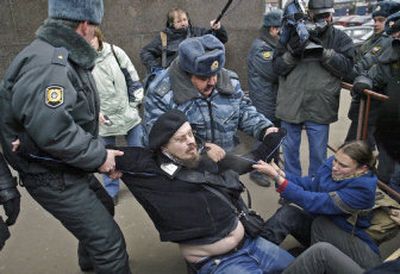Russia tightening the rules on NGOs

MOSCOW – In the latest sign of Russia’s backslide on democracy, the lower house of Parliament approved a draft bill Wednesday that would severely restrict the way domestic and foreign nongovernmental organizations operate and, critics say, could force many to scale back or even abandon their work here.
If the bill becomes law, foreign NGOs would be prohibited from operating branch offices in Russia and forced instead to re-register as local organizations, subjecting them to drastically increased government oversight. The legislation would also bar anyone who is not a permanent resident of Russia from working at an NGO here, activists say.
“In any form, it’s an odious law that imposes restrictions on the nonprofit sector that are intrusive and restrictive and largely unnecessary for what the government claims it wants to do,” said Steven Solnick, Moscow representative for the Ford Foundation, which has its headquarters in New York.
Russia has an estimated 400,000 domestic and foreign NGOs – including humanitarian groups, foundations and social service providers working on everything from human rights and poverty to HIV-AIDS prevention.
Analysts say the bill is part of the Kremlin’s systematic attempt to consolidate control over every segment of Russian society. Russia’s lower house, the Duma, is dominated by the pro-Kremlin United Russia party and is devoid of any serious opposition. Leaders of the nation’s 89 regions, previously installed in direct popular elections, are appointed by the president. The nation’s main television networks, which were once operated independently of the government, are now owned by it.
The latest move, critics say, is aimed at cracking down on one of the last remaining sectors of society that provides a much-needed check on government power: the civil sector.
“The government has chosen a rather subtle way, through this bill, to actually stop the development of civil society,” Yuri Dzhibladze, president of the Moscow-based Center for the Development of Democracy and Human Rights, said at a news conference this week.
The proposed bill is also thought to be a direct response to what some here have dubbed “orange paranoia,” or fear of the type of pro-democratic grass-roots activism that led to the Orange Revolution a year ago in neighboring Ukraine. Georgia had its Rose Revolution in 2003.
In remarks before the Duma in May, Nikolai Patrushev, director of the Federal Security Service, the successor organization to the KGB, claimed that foreign organizations in Russia were providing cover to spies and trying to incite popular uprisings across the now-independent countries of the former Soviet Union.
NGOs working on human rights issues, particularly those related to the war in Chechnya, have been under attack by the Russian government in recent years. Officials have refused to register them, tried to shut them down and hauled them to court for alleged tax violations, activists say.
Dzhibladze said the vast majority of Russia’s NGOs – about 80 percent – are not involved in human rights work at all but social issues that involve children, veterans and the disabled.